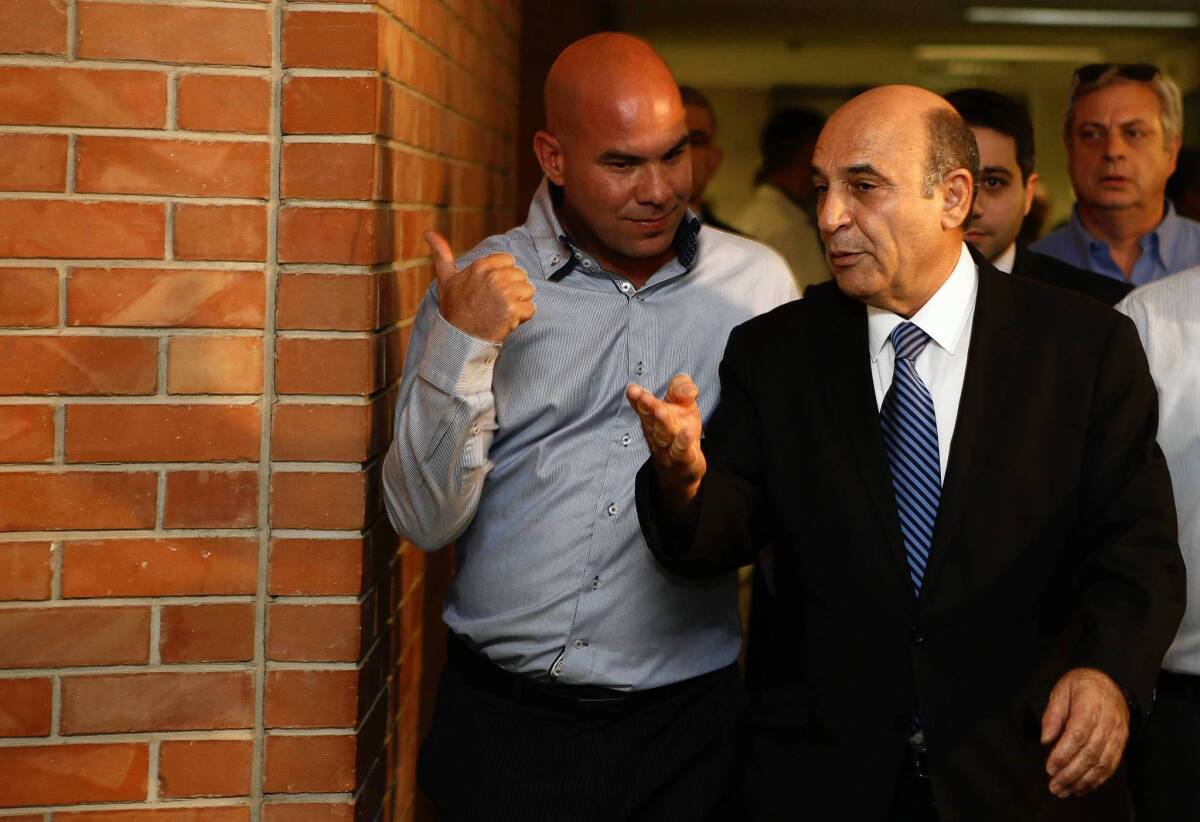Israeli Premier Netanyahu’s coalition crumbles with Kadima exit

JERUSALEM — Israel’smuch-touted ruling grand coalition broke apart Tuesday after the centrist Kadima party quit less than three months after it surprised the nation by joining Prime Minister Benjamin Netanyahu’s right-wing government.
The fracture, prompted by a dispute over a bill to draft religious students into the military, does not bring down Netanyahu’s government, but it probably will trigger early elections.
During a Kadima faction meeting, party leader Shaul Mofaz blamed Netanyahu for the split.
“It was not easy to enter the government,” he told members. “I paid a public price for it. But there’s no escape from the need to break away.”
Mofaz was seeking to pass a strict, enforceable law that would ensure that most ultra-Orthodox young people would be required to serve in the military like other Jewish 18-year-olds. Netanyahu is seeking a more gradual phase-in that would have addressed the concerns of politically powerful religious conservatives.
“I regret your decision to give up the opportunity to make an historic change,” Netanyahu wrote Tuesday in a letter to Mofaz released by the prime minister’s office. Netanyahu warned that moving too quickly on the draft policy risked “tearing Israeli society apart.”
Kadima leaders portrayed the sudden departure as a decision based on principles and leadership. But it is likely to undermine the credibility of Mofaz, who now will return to the opposition and seek to unseat Netanyahu in the next election.
Two years ago Mofaz encouraged Kadima to join Netanyahu’s government, then insisted this spring when he was elected party chairman that he would never join. He surprised the nation in May by doing exactly that.
Kadima’s participation created one of the biggest coalitions in Israel’s history and was praised as a political masterstroke by Netanyahu. At the time, the prime minister’s supporters predicted he would use the 78% majority in the Knesset, or parliament, to push through an aggressive agenda, possibly including a plan to restart peace talks with the Palestinians. Time magazine put him on its cover under the banner “King Bibi,” referring to his nickname.
Now Netanyahu and his Likud Party-led coalition will return to having a slim majority in the legislature, giving more influence to his smaller partners, like the ultra-Orthodox Shas party and the nationalist Yisrael Beiteinu.
“Netanyahu is still the boss and retains a smaller majority in the Knesset,” said Shlomo Aronson, a political science professor as the Hebrew University of Jerusalem. “But at the same time he is under a great deal of pressure because of the social protests and Iran, and he emerges looking less like a [master] manipulator.”
Instead of a political game-changer, the grand coalition with Kadima becomes a historic footnote that passed no major legislation and will be remembered as one of Israel’s shortest-lived governments.
“Both Netanyahu and Mofaz emerge from this move faltering and without credibility,” said Labor Party leader Shelly Yachimovich. “I call on both Netanyahu and Mofaz to put an end to this political farce and join us in a move for early elections so the public may speak its mind.”
In May, just a day before Kadima joined the government, Netanyahu announced he would hold early elections this September, nearly a year ahead of schedule. Now some pundits are predicting an election will take place in early 2013.
The draft issue has long been a particularly sensitive one for Israel and is likely to take center stage in the next vote no matter what the Knesset does.
By law, all Israelis are required to serve in the military, though exemptions have been carved out for most Arabs and also for the ultra-Orthodox, who study in religious schools instead. The country’s Supreme Court ruled early this year that the law exempting the ultra-Orthodox was unfair to other young Jewish people and must be voided by Aug. 1.
A proposed replacement law is likely to face a Knesset vote this week. But without the supermajority provided by Kadima, its fate is uncertain.
More to Read
Start your day right
Sign up for Essential California for news, features and recommendations from the L.A. Times and beyond in your inbox six days a week.
You may occasionally receive promotional content from the Los Angeles Times.






